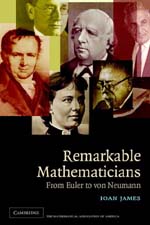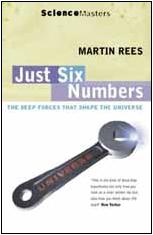book review
"As long as a branch of science offers an abundance of problems", proclaimed David Hilbert, "so is it alive". These words were delivered in the German mathematician's famous speech at the 1900 International Congress of Mathematics. He subsequently went on to describe 23 problems which he believed would spur on mathematical thought for the upcoming century.
"Mathematical Apocrypha" is, as its subtitle intimates, a book of stories and anecdotes about mathematicians and the mathematical. However, in contrast with many books about mathematicians, Steven Krantz focuses on contemporary figures such as Wiener, Littlewood and Hardy, and says very little about the usual myths regarding Pythagoras, Descartes or Euler.
"Dicing with Death" is a rarity: a book about statistics for the general public. Popular maths books are no longer uncommon, popular books on the physical sciences became a publishing phenomenon with Stephen Hawking, but popular statistics books are few and far between. Perhaps this fact is related to the poor public image of statistics, although it is difficult to say which is cause and which effect.
John Allen Paulos is the man who popularised the word "innumeracy", meaning the all-too-common condition of ignorance and bewilderment about maths and numbers in general. A light, cheerful and ever-so-slightly smug look at the problem, his best-known book of the same name (reviewed in Issue 11 of Plus) traces the roots of innumeracy to poor teaching and offers suggestions for antidotes and innoculation.
Are you interested in maths just for the fun of it? Or does mathematics seem irrelevant? Either way, this book is for you. Keith Ball is eager to share with his readers the way some of the numbers around us in the world work, and their uses.
In this well-written book, James Gleick (author of Chaos) tackles the life and work of Isaac Newton. He focuses on the man and his life in the historical context of Britain in the 17th Century, and, although the book is not a light read, he explains Newton's science well without the use of any equations.
Newton was born in 1642 in the time of the civil war (King Charles was beheaded when Newton was six years old).
Of all the classical functions, the Gamma function still retains much of its mystery and intrigue, since Euler first spotted it as something "worthy of serious consideration". In Gamma, Julian Havil explores Gamma from its birth and in so doing simultaneously deals with many related functions, problems and issues that go beyond the conventional territory of functions alone.
It is not uncommon for physics students to know more about the history of physics than mathematics students do about the history of mathematics. Physical laws often come with a name attached; mathematics constitutes a more homogenous structure, and thus tracing parentage can be harder.
Despite what the innumerate masses may wish, our daily lives are inextricably tied up with mathematics. On the most mundane level, we use basic arithmetic to do such things as tell the time, to count our change, to programme the video. But on a less obvious level we also need a reasonably good grasp of geometry in order to park the car in the garage or to pack the shopping bags carefully at the supermarket; we collect and interpret statistical data when the football results come in and we all seem to know how easily order turns to chaos.
Early in our mathematical careers, we are introduced to prime numbers. These special integers, which possess no divisors other than themselves and 1, are the building blocks for all the integers. Thus an understanding of the properties of primes, including where to find them, is an essential part of number theory, and any serious discussion of prime numbers will inevitably lead to what is arguably mathematics' greatest unsolved problem: The Riemann Hypothesis.
It seems amazing that the universe could be characterised by a mere six numbers, yet, according to Astronomer Royal Martin Rees, this is the case. He makes an excellent case for the necessity of these numbers, though he does not show that they are the only numbers we need.
Bill Bryson - he's a travel writer isn't he? He goes places and writes about them, tells amusing anecdotes about things he sees and people he meets, making his readers laugh at the same time as teaching them something about the places he visits?











